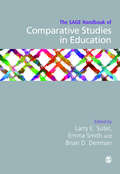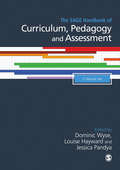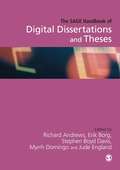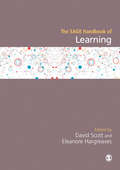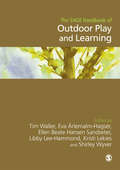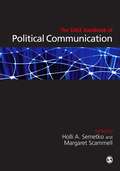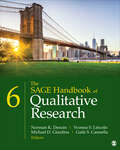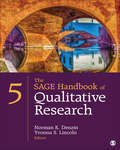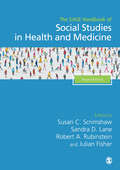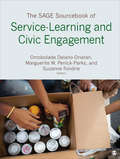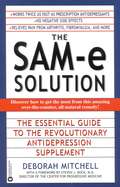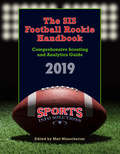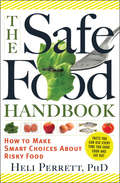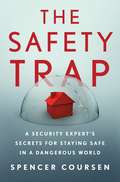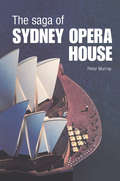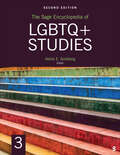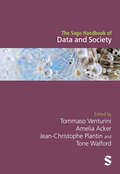- Table View
- List View
The SAGE Handbook of Comparative Studies in Education
by Emma Smith Larry E. Suter Brian D. DenmanEducational practices have rapidly changed in the last few decades, especially in how exchanges of information and learning are delivered and processed. Yet, while the field of international comparative studies has grown, there has not been an extensive study on the relationship between educational practices, students, and how practitioners are prepared and trained. This handbook explores international educational practices and behaviours through new research and a review of existing research, with chapters spread across six parts: Part I: Introduction to Research Practices in Comparative Studies of Education Part II: Research Methods Part III: Policy Transfer Research through International Comparisons Part IV: Use of Student time in Formal and Informal Settings Part V: School Practices from Early Childhood through Secondary School Part VI: Conclusion - Lessons from Large Scale Studies
The SAGE Handbook of Curriculum, Pedagogy and Assessment
by Ms Jessica Pandya Professor Dominic Wyse Ms Louise HaywardThe research and debates surrounding curriculum, pedagogy and assessment are ever-growing and are of constant importance around the globe. With two volumes - containing chapters from highly respected researchers, whose work has been critical to understanding and building expertise in the field - The SAGE Handbook of Curriculum, Pedagogy and Assessment focuses on examining how curriculum is treated and developed, and its impact on pedagogy and assessment worldwide. The Handbook is organised into five thematic sections, considering: · The epistemology and methodology of curriculum · Curriculum and pedagogy · Curriculum subjects · Areas of the curriculum · Assessment and the curriculum · The curriculum and educational policy The SAGE Handbook of Curriculum, Pedagogy and Assessment's breadth and rigour will make it essential reading for researchers and postgraduate students around the world.
The SAGE Handbook of Digital Dissertations and Theses: SAGE Publications
by Stephen N. Davis Jude England Myrrh Domingo Erik Borg Mr Richard N. L. AndrewsThis handbook sets out the processes and products of 'digital' research. It is a theoretical and practical guide on how to undertake and navigate advanced research in the arts, humanities and social sciences. Topics covered include: - how to make research more accessible - the use of search engines and other sources to determine the scope of work - research training for students - what will theses, dissertations and research reports look like in ten years' time? - the storing and archiving of such research - ethics and methodologies in the field - intercultural issues The editors focus on advances in arts and practice-based doctorates, and their application in other fields and disciplines. The contributions chart new territory for universities, research project directors, supervisors and research students regarding the nature and format of Masters and doctoral work, as well as research projects. This handbook is an essential reference for researchers, supervisors and administrators on how to conduct and evaluate research projects in a digital and multimodal age. Richard Andrews is Professor in English, Faculty of Children and Learning, Institute of Education. Erik Borg is a Senior Lecturer at Coventry University's Centre for Academic Writing. Stephen Boyd Davis is Research Leader in the School of Design, Royal College of Art. Myrrh Domingo is Visiting Assistant Professor in English Education and Literacy Education at New York University. Jude England is Head of Social Sciences at the British Library.
The SAGE Handbook of Learning
by Dr Eleanore Hargreaves Professor David Scott"Profound and useful, readers will benefit from the systematic treatment of learning through superb scholarship. Cultural-philosophical-curricular-pedagogical-historical perspectives on learning, curriculum, pedagogy, and assessment, and learners make this collection unique." - Carol A. Mullen, Professor of Educational Leadership, Virginia Tech Learning is a fundamental topic in education. Combining traditional views of learning and learning theory with sociocultural and historical perspectives, this Handbook brings together original contributions from respected researchers who are leading figures in the field. The editors provide a insightful introduction to the topic, and the theories, frameworks, themes and issues discussed in the individual chapters are central to each and every learning episode. The Handbook is organized into four sections, each beginning with a short introduction: Philosophical, Sociological and Psychological Theories of Learning Models of Learning Learning, Curriculum, Pedagogy and Assessment Learning Dispositions, Life-Long Learning and Learning Environments
The SAGE Handbook of Learning
by Dr Eleanore Hargreaves Professor David Scott"Profound and useful, readers will benefit from the systematic treatment of learning through superb scholarship. Cultural-philosophical-curricular-pedagogical-historical perspectives on learning, curriculum, pedagogy, and assessment, and learners make this collection unique." - Carol A. Mullen, Professor of Educational Leadership, Virginia Tech Learning is a fundamental topic in education. Combining traditional views of learning and learning theory with sociocultural and historical perspectives, this Handbook brings together original contributions from respected researchers who are leading figures in the field. The editors provide a insightful introduction to the topic, and the theories, frameworks, themes and issues discussed in the individual chapters are central to each and every learning episode. The Handbook is organized into four sections, each beginning with a short introduction: Philosophical, Sociological and Psychological Theories of Learning Models of Learning Learning, Curriculum, Pedagogy and Assessment Learning Dispositions, Life-Long Learning and Learning Environments
The SAGE Handbook of Outdoor Play and Learning
by Professor Tim Waller Dr Eva Ärlemalm-Hagsér Dr Shirley Wyver Ellen Beate Hansen Sandseter Kristi S. Lekies Libby Lee-HammondThere has been a growing academic interest in the role of outdoor spaces for play in a child's development. This text represents a coordinated and comprehensive volume of international research on this subject edited by members of the well-established European Early Childhood Education Research Association Outdoor Play and Learning SIG (OPAL). Chapters written by authors from Europe, North and South America, Australasia and Asia Pacific countries are organised into six sections: Theoretical Frameworks and Conceptual Approaches for Understanding Outdoor Play & Learning Critical Reflections on Policy and Regulation in Outdoor Play & Learning Children's Engagement with Nature, Sustainability and Children's Geographies Diverse Contexts and Inclusion in Children's Outdoor Play Environments Methodologies for Researching Outdoor Play and Learning Links Between Research and Practice
The SAGE Handbook of Outdoor Play and Learning
by Professor Tim Waller Dr Eva Ärlemalm-Hagsér Dr Shirley Wyver Ellen Beate Hansen Sandseter Kristi S. Lekies Libby Lee-HammondThere has been a growing academic interest in the role of outdoor spaces for play in a child's development. This text represents a coordinated and comprehensive volume of international research on this subject edited by members of the well-established European Early Childhood Education Research Association Outdoor Play and Learning SIG (OPAL). Chapters written by authors from Europe, North and South America, Australasia and Asia Pacific countries are organised into six sections: Theoretical Frameworks and Conceptual Approaches for Understanding Outdoor Play & Learning Critical Reflections on Policy and Regulation in Outdoor Play & Learning Children's Engagement with Nature, Sustainability and Children's Geographies Diverse Contexts and Inclusion in Children's Outdoor Play Environments Methodologies for Researching Outdoor Play and Learning Links Between Research and Practice
The SAGE Handbook of Political Communication
by Dr Margaret Scammell Holli A SemetkoThis authoritative and comprehensive survey of political communication draws together a team of the world's leading scholars to provide a state-of-the-art review that sets the agenda for future study. It is divided into five sections: Part One: explores the macro-level influences on political communication such as the media industry, new media, technology, and political systems Part Two: takes a grassroots perspective of the influences of social networks - real and online - on political communication Part Three: discusses methodological advances in political communication research Part Four: focuses on power and how it is conceptualized in political communication Part Five: provides an international, regional, and comparative understanding of political communication in its various contexts The SAGE Handbook of Political Communication is an essential benchmark publication for advanced students, researchers and practitioners in the fields of politics, media and communication, sociology and research methods.
The SAGE Handbook of Qualitative Research
by Norman K. Denzin Yvonna S. LincolnThis new edition of the SAGE Handbook of Qualitative Research represents the sixth generation of the ongoing conversation about the discipline, practice, and conduct of qualitative inquiry. As with earlier editions, the Sixth Edition is virtually a new volume, with 27 of the 34 chapters representing new topics or approaches not seen in the previous edition, including intersectionality; critical disability research; postcolonial and decolonized knowledge; diffraction and intra-action; social media methodologies; thematic analysis, collaborative inquiry from the borderlands; qualitative inquiry and public health science; co-production and the politics of impact; publishing qualitative research; and academic survival. Authors in the Sixth Edition engage with questions of ontology and epistemology, the politics of the research act, the changing landscape of higher education, and the role qualitative researchers play in contributing to a more just, egalitarian society. To mark the Handbook’s 30-year history, we are pleased to offer a bonus PART VI in the eBook versions of the Sixth Edition: this additional section brings together and reprints ten of the most famous or game-changing contributions from the previous five editions.
The SAGE Handbook of Qualitative Research
by Norman K. Denzin Yvonna S. LincolnThis new edition of the SAGE Handbook of Qualitative Research represents the sixth generation of the ongoing conversation about the discipline, practice, and conduct of qualitative inquiry. As with earlier editions, the Sixth Edition is virtually a new volume, with 27 of the 34 chapters representing new topics or approaches not seen in the previous edition, including intersectionality; critical disability research; postcolonial and decolonized knowledge; diffraction and intra-action; social media methodologies; thematic analysis, collaborative inquiry from the borderlands; qualitative inquiry and public health science; co-production and the politics of impact; publishing qualitative research; and academic survival. Authors in the Sixth Edition engage with questions of ontology and epistemology, the politics of the research act, the changing landscape of higher education, and the role qualitative researchers play in contributing to a more just, egalitarian society. To mark the Handbook’s 30-year history, we are pleased to offer a bonus PART VI in the eBook versions of the Sixth Edition: this additional section brings together and reprints ten of the most famous or game-changing contributions from the previous five editions.
The SAGE Handbook of Qualitative Research: Denzin: The Sage Handbook Of Qualitative Research 5e + Plano Clark: Mixed Methods Research
by Norman K. Denzin Yvonna S. LincolnThe substantially updated and revised Fifth Edition of this landmark handbook presents the state-of-the-art theory and practice of qualitative inquiry. Representing top scholars from around the world, the editors and contributors continue the tradition of synthesizing existing literature, defining the present, and shaping the future of qualitative research. The Fifth Edition contains 19 new chapters, with 16 revised—making it virtually a new volume—while retaining six classic chapters from previous editions. New contributors to this edition include Jamel K. Donnor and Gloria Ladson-Billings; Margaret Kovach; Paula Saukko; Bryant Keith Alexander; Thomas A. Schwandt and Emily F. Gates; Johnny Saldaña; Uwe Flick; Mirka Koro-Ljungberg, Maggie MacLure, and Jasmine Ulmer; Maria Elena Torre, Brett G. Stoudt, Einat Manoff, and Michelle Fine; Jack Bratich; Svend Brinkmann; Eric Margolis and Renu Zunjarwad; Annette N. Markham; Alecia Y. Jackson and Lisa A. Mazzei; Jonathan Wyatt, Ken Gale, Susanne Gannon, and Bronwyn Davies; Janice Morse; Peter Dahler-Larsen; Marc Spooner; and David A. Westbrook.
The SAGE Handbook of Qualitative Research: Denzin: The Sage Handbook Of Qualitative Research 5e + Plano Clark: Mixed Methods Research
by Norman K. Denzin Yvonna S. LincolnThe substantially updated and revised Fifth Edition of this landmark handbook presents the state-of-the-art theory and practice of qualitative inquiry. Representing top scholars from around the world, the editors and contributors continue the tradition of synthesizing existing literature, defining the present, and shaping the future of qualitative research. The Fifth Edition contains 19 new chapters, with 16 revised—making it virtually a new volume—while retaining six classic chapters from previous editions. New contributors to this edition include Jamel K. Donnor and Gloria Ladson-Billings; Margaret Kovach; Paula Saukko; Bryant Keith Alexander; Thomas A. Schwandt and Emily F. Gates; Johnny Saldaña; Uwe Flick; Mirka Koro-Ljungberg, Maggie MacLure, and Jasmine Ulmer; Maria Elena Torre, Brett G. Stoudt, Einat Manoff, and Michelle Fine; Jack Bratich; Svend Brinkmann; Eric Margolis and Renu Zunjarwad; Annette N. Markham; Alecia Y. Jackson and Lisa A. Mazzei; Jonathan Wyatt, Ken Gale, Susanne Gannon, and Bronwyn Davies; Janice Morse; Peter Dahler-Larsen; Marc Spooner; and David A. Westbrook.
The SAGE Handbook of Social Studies in Health and Medicine
by Robert A. Rubinstein Susan C. Scrimshaw Sandra D. Lane Julian FisherWith new chapters on key topics such as mental health, the environment, race, ethnicity and health, and pharmaceuticals, this new edition maintains its multidisciplinary framework and bridges the gap between health policy and the sociology of health. It builds upon the success of the first by encompassing a range of issues, studies, and disciplines. The broad coverage of topics in addition to new chapters present an engagement with contemporary issues, resulting in a valuable teaching aid. This second edition brings together a diverse range of leading international scholars with contributors from Australia, Puerto-Rico, USA, Guatemala, Germany, Sri Lanka, Botswana, UK, South Sudan, Mexico, South Korea, Canada and more. The second edition of this Handbook remains a key resource for undergraduates, post-graduates, and researchers across multidisciplinary backgrounds including: medicine, health and social care, sociology, and anthropology. PART ONE: Culture, Society and Health PART TWO: Lived Experiences PART THREE: Health Care Systems, Access and Use PART FOUR: Health in Environmental and Planetary Context
The SAGE Handbook of Social Studies in Health and Medicine
by Robert A. Rubinstein Susan C. Scrimshaw Sandra D. Lane Julian FisherWith new chapters on key topics such as mental health, the environment, race, ethnicity and health, and pharmaceuticals, this new edition maintains its multidisciplinary framework and bridges the gap between health policy and the sociology of health. It builds upon the success of the first by encompassing a range of issues, studies, and disciplines. The broad coverage of topics in addition to new chapters present an engagement with contemporary issues, resulting in a valuable teaching aid. This second edition brings together a diverse range of leading international scholars with contributors from Australia, Puerto-Rico, USA, Guatemala, Germany, Sri Lanka, Botswana, UK, South Sudan, Mexico, South Korea, Canada and more. The second edition of this Handbook remains a key resource for undergraduates, post-graduates, and researchers across multidisciplinary backgrounds including: medicine, health and social care, sociology, and anthropology. PART ONE: Culture, Society and Health PART TWO: Lived Experiences PART THREE: Health Care Systems, Access and Use PART FOUR: Health in Environmental and Planetary Context
The SAGE Sourcebook of Service-Learning and Civic Engagement
by Bola Delano-Oriaran Marguerite W. Penick-Parks Dr Suzanne FondrieService-Learning and Civic Engagement: A Sourcebook focuses on historical, philosophical, social foundations, practices and models of service-learning and civic engagement. The title offers practical, jargon-free chapters applicable to any educational institution as well as community organizations that might consult the work. Key Features Practical, jargon-free chapters applicable to any educational institution as well as community organizations that might consult the work 58 signed chapters are organized into thematic parts, such as Concepts & Theoretical Approaches, Historical & Social Foundations, The Role of Service-Learning in Higher Education, The Role of the Community, Lessons Learned & Future Directions, etc. Thematic parts provide a practical sampling of syllabi, lesson plans, activities and resources, and online websites and databases supporting service-learning. Glossary (key terms commonly used in discussions and research on service-learning and civic engagement) Bibliography of sources consulted in production of the volume This Sourcebook is a scholarly source ideal for any educational institution and academic library as well as public libraries and community organizations that might consult the work on historical, philosophical social foundations, practices and models of service-learning and civic engagement.
The SAGE Sourcebook of Service-Learning and Civic Engagement
by Bola Delano-Oriaran Marguerite W. Penick-Parks Dr Suzanne FondrieService-Learning and Civic Engagement: A Sourcebook focuses on historical, philosophical, social foundations, practices and models of service-learning and civic engagement. The title offers practical, jargon-free chapters applicable to any educational institution as well as community organizations that might consult the work. Key Features Practical, jargon-free chapters applicable to any educational institution as well as community organizations that might consult the work 58 signed chapters are organized into thematic parts, such as Concepts & Theoretical Approaches, Historical & Social Foundations, The Role of Service-Learning in Higher Education, The Role of the Community, Lessons Learned & Future Directions, etc. Thematic parts provide a practical sampling of syllabi, lesson plans, activities and resources, and online websites and databases supporting service-learning. Glossary (key terms commonly used in discussions and research on service-learning and civic engagement) Bibliography of sources consulted in production of the volume This Sourcebook is a scholarly source ideal for any educational institution and academic library as well as public libraries and community organizations that might consult the work on historical, philosophical social foundations, practices and models of service-learning and civic engagement.
The SAM-e Solution: The Essential Guide to the Revolutionary Antidepressant Supplement
by Deborah MitchellAn authoritative and in-depth look at a breakthrough natural antidepressant, this book is by a recognized authority on natural healing and the author of "Natural Medicine for Diabetes" and "Natural Healing for Back Pain."
The SIS Football Rookie Handbook 2019: Comprehensive Scouting and Analysis Guide
by Sports Info SolutionsOne of the biggest factors in football is the large number of rookies who come into the NFL each year from literally hundreds of colleges and universities, where they play a relatively few games over a limited number of years before being drafted for the pros. Yet many of these young players end up in starting and even starring roles in their first year. Where are avid fans to look for real information on the rookies who may play for their team—or those of their hated rivals—in the upcoming season? The answer to that question is in your hands. Here you will find the very best updated info on over 250 players who may be drafted or signed as free agent rookies in 2019.
The SNES Encyclopedia: Every Game Released for the Super Nintendo Entertainment System
by Chris Scullion“If you didn’t grow up with an SNES and are curious to know about games like Chrono Trigger, Super Metroid and more, then this is the book for you.” —Got Game Following on from the previously released NES Encyclopedia, The SNES Encyclopedia is the ultimate resource for fans of Nintendo’s second home video game console, the Super Nintendo Entertainment System.Containing detailed information on all 780 games released for the SNES in the west, this enormous book is full of screenshots, trivia and charmingly bad jokes. It also includes a bonus section covering the entire twenty-two-game library of the Virtual Boy, Nintendo’s ill-fated 3D system which was released at the end of the SNES’s life.“Without question, The SNES Encyclopedia: Every Game Released for the Super Nintendo Entertainment System makes for an excellent video game library addition. It’s an economical and well-crafted book of Nintendo’s 16-bit history, and it’s sure to leave you yearning for the days of Super Mario World’s vibrant colors, Super Metroid’s intoxicating atmosphere, and Super Punch Out!!’s incredible tension. If you already own The NES Encyclopedia, you’ll know what to expect, but if you’re just starting a collection of video game-themed books, you can’t go wrong with this condense and informative offering.” —Nintendo World Report
The Safe Food Handbook: How to Make Smart Choices About Risky Food
by Heli PerrettA helpful, easy reference on food safety from a microbiologist and public health expert. The Safe Food Handbook is an essential guide for everyone, especially those most vulnerable to unsafe food: pregnant women, older adults, young children, those with serious health conditions, and anyone who cooks for them. Dr. Heli Perrett provides clear guidance on how to: Recognize the riskiest foods and places to eatProtect yourself from dangerous microbes like E. coli and salmonellaReduce toxins that build up in your bodyLearn which corners you can cut—and which you shouldn’tEnjoy your favorite foods without hurting your health or your budget Organized by food group, The Safe Food Handbook demystifies the perils in our food—infectious bacteria, deadly molds, hormones, antibiotics, toxins, irradiation, and even wax on produce. It explains what to watch for in fruits and vegetables; fish and shellfish; meat and poultry; dairy; eggs; grains, legumes and nuts; and even herbs and spices. Also included are answers to questions on shopping (“What exactly does this label mean?”), eating out (“What should I avoid in restaurants?”), and food preparation and storage (“How long can I save these leftovers?”)—so instead of worrying, you can relax and enjoy some good, healthy food. “Perrett writes in a manner that clears the fog of claims surrounding food risks and safety.” —Library Journal “She answers many frequently asked questions about prepackaged food, organic products, and what precautions to take with dishes such as sushi and raw beef. She even answers questions readers may not think to ask such as how to avoid distasteful, contaminated spices.” —Ruth Winter, MS, author of A Consumer’s Dictionary of Food Additives
The Safety Trap: A Security Expert's Secrets for Staying Safe in a Dangerous World
by Spencer CoursenThreat management expert Spencer Coursen offers proactive strategies to protect yourself and your loved ones in the event of hostile encounters and emergency situations in The Safety Trap: A Security Expert’s Secrets for Staying Safe in a Dangerous World.Despite what the news and social media would have you believe, we have never lived in a safer time than we are now. Unfortunately, we live under a false sense of security enforced by authorities that only alleviates fears without reducing risk. We have placed our personal safety, and our responsibilities of guarding it, into the hands of people trained only to respond to crises, not actively prevent them. Our blind faith in institutions to protect us has only dulled our natural survival instincts. The truth is that when we feel safest is actually when we are in the most danger.This is the paradox of The Safety Trap.When you don’t expect danger, you simply fail to see the signs that something bad is about to happen. But the signs are always there, and staying safe is about training yourself to see them. In easy-to-implement methods of maintaining vigilance, assessing risk, and taking preventative measures, you’ll discover how to be alert without anxiety and know how to best protect and defend yourself on the job, in school, in public places, at home, and online.With Coursen’s simple formula of Awareness + Preparation = Safety as your guide—as well as real world examples of managing threats—you will learn how to develop the skills and confidence to reclaim your own security and avoid The Safety Trap.
The Saga of Sydney Opera House: The Dramatic Story of the Design and Construction of the Icon of Modern Australia
by Peter MurrayPeter Murray's compelling and highly readable biography of the building presents both sides of the story. Using previously unpublished files and papers, Murray has managed to unravel one of the most intriguing architectural controversies of recent times - what really happened when they built Sydney Opera House...
The Sage Encyclopedia of LGBTQ+ Studies, 2nd Edition
by Abbie E. GoldbergThe SAGE Encyclopedia of LGBTQ Studies, 2nd Edition is aimed at students and educators interested in an interdisciplinary perspective on LGBTQ issues. It examines and provides understandings of the lives and experiences of LGBTQ individuals, with attention to the contexts and forces that shape their world. The volume addresses questions such as: What are the key theories used to understand variations in sexual orientation and gender identity? What does LGBTQ+ affirmative therapy look like? How have anti-LGBTQ ballot measures affected LGBTQ people? What are LGBTQ+ people’s experiences during COVID-19? How were LGBTQ+ people impacted by the Trump administration? What is life like for LGBTQ+ people living outside the United States? This encyclopedia looks at LGBTQ issues and identity primarily through the lenses of psychology, human development, and sociology, while emphasizing queer, feminist, and ecological perspectives on this topic. Entries are written by top researchers and clinicians across multiple fields—psychology, human development, gender/queer studies, sexuality studies, social work, nursing, cultural studies, education, family studies, medicine, public health, and sociology.
The Sage Encyclopedia of LGBTQ+ Studies, 2nd Edition
by Abbie E. GoldbergThe SAGE Encyclopedia of LGBTQ Studies, 2nd Edition is aimed at students and educators interested in an interdisciplinary perspective on LGBTQ issues. It examines and provides understandings of the lives and experiences of LGBTQ individuals, with attention to the contexts and forces that shape their world. The volume addresses questions such as: What are the key theories used to understand variations in sexual orientation and gender identity? What does LGBTQ+ affirmative therapy look like? How have anti-LGBTQ ballot measures affected LGBTQ people? What are LGBTQ+ people’s experiences during COVID-19? How were LGBTQ+ people impacted by the Trump administration? What is life like for LGBTQ+ people living outside the United States? This encyclopedia looks at LGBTQ issues and identity primarily through the lenses of psychology, human development, and sociology, while emphasizing queer, feminist, and ecological perspectives on this topic. Entries are written by top researchers and clinicians across multiple fields—psychology, human development, gender/queer studies, sexuality studies, social work, nursing, cultural studies, education, family studies, medicine, public health, and sociology.
The Sage Handbook of Data and Society
by Jean-Christophe Plantin Tommaso Venturini Amelia Acker Tone WalfordThe Sage Handbook of Data and Society provides a comprehensive exploration of the impact of data on society. Addressing urgent research questions in this rapidly evolving field and offering a balanced mix of introductory insights and advanced analyses, this resource offers a nuanced understanding of critical data studies and their relevance to contemporary society. Through detailed examinations of specific issues, cases, concepts, and methodologies, the handbook fosters a critical proximity to the entanglement of social dynamics and their data doubles. Organized into seven sections, the handbook covers a diverse range of topics, including data infrastructures, digital labor, power dynamics, environmental challenges, bodily experiences, scientific methodologies, and disciplinary intersections. Each section offers a broad examination of critical issues, highlighting interdisciplinary scholarship and presenting fresh perspectives on the intricate relationship between data and societal structures. Featuring contributions from scholars representing various disciplines and global perspectives, The Sage Handbook of Data and Society is an invaluable resource for scholars, researchers, students, and practitioners. By encouraging critical engagement with the profound impacts of datafication, this handbook equips readers with the necessary tools to navigate the complexities of the digital age and comprehend its implications for contemporary society. Section 1: Infrastructures of Data Section 2: Labor of Data Section 3: Power and Struggles of Data Section 4: Data and Crises of Nature Section 5: Data and Bodies Section 6: The Sciences of Data Section 7: Disciplines of Data
